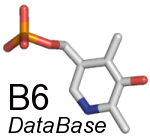|
|
| type |
Journal Article |
| authors |
Bantysh O, Serebryakova M, Makarova KS, Dubiley S, Datsenko KA, Severinov K
|
| title |
Enzymatic synthesis of bioinformatically predicted microcin C-like compounds encoded by diverse bacteria |
| journal |
MBio |
| Activity |
mcce |
| Family |
mcce |
| sel |
selected |
| ui |
24803518 |
| year |
(2014) |
| volume |
5 |
| number |
3 |
| pages |
e01059-14 |
| | |
|---|
| keywords |
doi: 10.1128/mBio.01059-14 |
| abstract |
The Trojan horse Escherichia coli antibiotic microcin C (McC) consists of a heptapeptide attached to adenosine through a phosphoramidate linkage. McC is synthesized by the MccB enzyme, which terminally adenylates the ribosomally synthesized heptapeptide precursor MccA. The peptide part is responsible for McC uptake; it is degraded inside the cell to release a toxic nonhydrolyzable aspartyl-adenylate. Bionformatic analysis reveals that diverse bacterial genomes encoding mccB homologues also contain adjacent short open reading frames that may encode MccA-like adenylation substrates. Using chemically synthesized predicted peptide substrates and recombinant cognate MccB protein homologs, adenylated products were obtained in vitro for predicted MccA peptide-MccB enzyme pairs from Helicobacter pylori, Streptococcus thermophilus, Lactococcus johnsonii, Bartonella washoensis, Yersinia pseudotuberculosis, and Synechococcus sp. Some adenylated products were shown to inhibit the growth of E. coli by targeting aspartyl-tRNA synthetase, the target of McC. IMPORTANCE Our results prove that McC-like adenylated peptides are widespread and are encoded by both Gram-negative and Gram-positive bacteria and by cyanobacteria, opening ways for analyses of physiological functions of these compounds and for creation of microcin C-like antibiotics targeting various bacteria. |
| last changed |
2017/12/05 11:02 |
|











